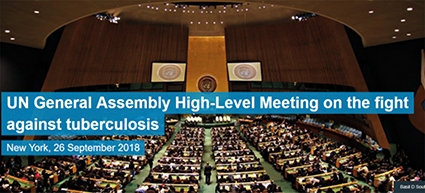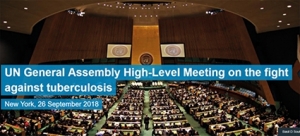The First UN High-Level Meeting on the Fight to End TB
The UN held a meeting to discuss the growing rate of multidrug-resistant Tuberculosis (TB), or MDR TB. Georgia has one of the highest rates for drug-resistant TB in Europe, and is currently working on the fight against it.
In July, the launch of SimpliciTB took place at the National Center for Tuberculosis and Lung Disease in Tbilisi, a trail which combines four new medications and aims to shorten treatment times to six months instead of 24. World leaders and senior representatives came together at the first United Nations high-level meeting on TB in New York on Wednesday, where heads of state adopted a political declaration with commitments to accelerate action and funding to end the tuberculosis epidemic by 2030.
According to the World Health Organization’s latest TB report, it killed 1.6 million people in 2017, which makes it the most deadly infectious disease worldwide, and experts say progress is not happening fast enough.
Drug-resistant TB (MDR TB) has become a growing problem, with the majority of new Tuberculosis patients classed as having it, meaning that they are resistant to more than one first-line drug. Treatment in these cases can be lengthy, complex, and expensive, with severe side-effects. As a result, only 55% of MDR-TB patients are cured, according to WHO.
Georgia has the highest rates of drug-resistant TB, but infection rates have been increasing rapidly in parts of Africa and Southeast Asia. The Tbilisi drug trials offer hope for patients with drug-resistant TB by giving them access to combined oral-only regimens in place of older, injection-based treatments, which are less toxic and require a shorter treatment time.
Patients on the ZeNix trial, which started last year and is set to run for four years, are already showing promising results, according to lead clinician Lali Mikiashvili. Eight patients have now finished the six-month treatment and have been “cured,” however they will be kept under close observation for signs of relapse for a further 18 months.
“It is a revolutionary regimen; it’s unbelievably simple and short, every patient has responded quickly, showed high efficacy and tolerability … [and] none have shown serious side effects. If successful, this is the future treatment for hundreds of thousands of patients suffering from one of the most dangerous diseases in the world,” said Mikiashvili.
The ZeNix trial focuses on patients with highly-resistant TB, however, the SimpliciTB trials’ focus lies on those with both ordinary TB and MDR-TB. The trial is testing a regime of four drugs, all of which can be taken orally, known as BPaMZ, to see whether it can cut and simplify the treatment process down to four months for those with drug-sensitive TB, and six months for those with more resistant strains. Current treatment times for MDR-TB can be up to two years.
Marika Eristavi, who is leading the SimpliciTB trial, said patients are responding well to the new treatment. If successful, it could “reduce the rate of TB in Georgia as well as worldwide,” she said.
TB Alliance, a nonprofit that works to accelerate the development and affordability of new TB drugs, is managing both trials.
“As resistance to current TB treatments continues to grow, we need to introduce all-oral drug regimens that can treat every person with TB in six months or less, regardless of their resistance profile. If proven successful in SimpliciTB, the BPaMZ regimen would represent a major step toward this goal,” said Mel Spigelman, President and CEO at TB Alliance.
The recent high-level meeting has been described by WHO as an unprecedented step forward by governments and all partners engaged in the fight against TB.
“Heads of state and government attending this first-ever UN High-level meeting on TB agreed to mobilize $13 billion a year by 2022 to implement TB prevention and care, and $2 billion for research. They committed to take firm action against drug-resistant forms of the disease; build accountability and to prioritize human rights issues such as the stigma that still prevails around TB in many parts of the world,” the WHO said.
The President of the General Assembly of the United Nations, María Fernanda Espinosa Garcés, noted that ending TB is both “a moral and a political responsibility,” and that TB is “not egalitarian” in its impact, as it primarily affects the poorest and most marginalized communities.
After adopting the political declaration on TB at the start of the meeting (PDF at UN.org), Garcés called on heads of state to “move from words to deeds.” Lucica Ditiu, executive director of Stop TB Partnership, a key body mentioned in the declaration, said that the final document is sufficient in terms of its targets, but it could be stronger on accountability and access to medicines. In addition to the main commitments in the political declaration, Aaron Motsoaledi, Minister of Health of South Africa and Chair of Stop TB Partnership, added two more. One is that “heads of state should speak spontaneously on TB, without referring to their prepared remarks,” and the second is that when asked if there is enough money to end TB, heads of state should respond with the question: “Can we afford not to?”
Bill Gates, business luminary and founder of the Bill and Melinda Gates Foundation, gave the keynote address during the first multi-stakeholder panel of the meeting, noting that there has been progress, but also highlighting a major challenge: that some 40% of people with TB still remain undiagnosed.
“The private sector has the skills to play a key role in this effort, particularly pharmaceutical companies,” said Gates. He also called for increased engagement with private sector health providers, as a key strategy to expanding access to diagnosis and treatment.
During the first multi-stakeholder panel, the representative from the German mission to the UN noted that it is everyone’s shared responsibility to achieve the ambitious targets that are in the political declaration and that without strengthening the health system, they will not stop TB.
By Shawn Wayne












